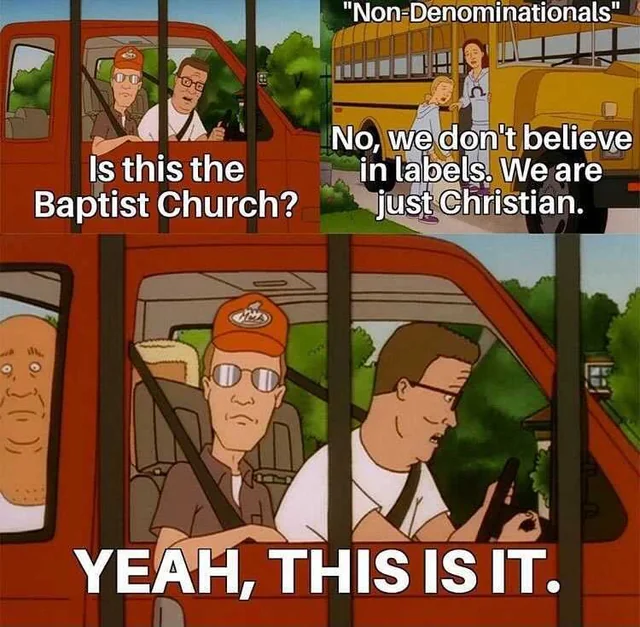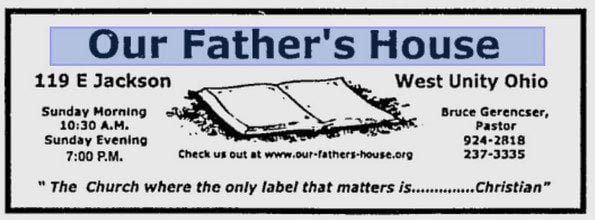
One way Evangelicals hide their beliefs and practices is to self-identify as “nondenominational.” Sectarian affiliation carries certain baggage that may turn some people off, especially if they have had negative experiences with a particular denomination. Using the nondenominational label gives people unfamiliar with Evangelicalism a false impression of a church or pastor. Nondenominational says to people that a particular church or preacher has no sectarian connection or beliefs. This, of course, is patently untrue.
Most nondenominational churches are independent (or quasi-independent) Baptist assemblies that typically have congregational government structures. All one needs to do is look at a church’s official statement of belief to see that there is no doctrinal difference to speak of between First Baptist Church and Praise Cathedral and Bible Baptist Church and Bada Boom Bada Bing Jesus is Lord Assembly. Each church might be Charismatic, Pentecostal, Calvinistic, or Arminian, or have differing views on eschatology, pneumatology, or other secondary issues, but their core doctrinal beliefs and practices are similar, if not identical.
Evangelicalism is defined by certain foundational beliefs and practices. Thus, Evangelicalism is a Christian sect divided according to peculiar secondary beliefs. And yes, I am aware that some churches and pastors elevate these secondary beliefs to the level of what people must believe to be a Christian. For example, some Calvinists think Arminians are unsaved and some Pentecostals think “Christians” who aren’t baptized by immersion or who don’t speak in tongues aren’t saved either. Evangelicalism is, in every way, a denomination in the same way the Southern Baptist Convention (SBC) is a denomination. Churches may be independent or loosely affiliated, but their beliefs and practices suggest they are denominational.
A common ploy among Evangelical churches is for congregations to drop their denominational names. This is especially true for churches affiliated with the SBC and the Assembly of God. The goal is to give off the appearance of being nondenominational and hopefully lessen the negative opinions people have of denominations.
I have previously shared that while Independent Fundamentalist Baptist (IFB) churches are “independent,” they do affiliate with one another, just as Southern Baptists do. (Please see Let’s Go Camping: Understanding Independent Fundamentalist Baptist Camps.) IFB churches have horrible reputations. What better way to distance a church from being viewed this way than to change its name and remove IFB from all church literature and advertising? King James Baptist Church becomes Bible Believer’s Community Church and Victory Baptist Church becomes Faith Bible Church. Nothing changes except the name.

Lifewise Academy — an Evangelical parachurch organization — exploits a quirk in federal and state law to establish release-time Bible classes for Ohio public school students. Currently, over 170 school districts have Lifewise programs! How in the hell did this happen? Lifewise tells two lies to school boards and superintendents:
- We are a nondenominational program
- We teach children morals and ethics
Lifewise is, in fact, Evangelical. I mean 100 percent, unabashed Evangelical. Lifewise doesn’t teach generic morality and ethics; it teaches explicitly Evangelical dogma. Internal Lifewise documents reveal that the organization’s number one goal is to evangelize students perceived to be unsaved. If Lifewise is nondenominational, children of all sects would be welcome, and no attempt would be made to “save” them. That’s not what’s happening. Suppose your child is Roman Catholic or attends a Unitarian congregation. Will they be considered “Christians?” Maybe, by some of the teachers, but Lifewise’s internal documents suggest that such children are ripe for conversion. According to Lifewise, there is one gospel (theirs) and one plan of salvation (theirs). A Catholic child who thinks baptism and confirmation “save” her is deceived (by Satan himself). Catholicism is a false religion, the whore of Babylon. The Unitarian child? My God, he thinks all roads lead to God and Heaven and good works are what matter. He definitely is deceived. Lifewise’s grand plan is to make every child a good Evangelical and make sure that they are attending a “good” Bible-believing church.
The next time a Christian tells you she is nondenominational, ask yourself what she is trying to hide? If she is a Baptist or a Pentecostal or a Charismatic, why doesn’t she proudly wear her denominational name tag? What doesn’t she want you to know or see? Don’t take my word for it. Go visit a local Southern Baptist congregation and then visit a church that says it is nondenominational. Set aside music and preaching differences, paying careful attention to their beliefs and practices. Don’t pay attention to secondary issues that separate them. Once the peripheral stuff is peeled back, you will likely find a Baptist church with a congregational ecclesiology. The nondenominational label is little more than a magic trick clerics and sects use to hide their sectarian distinctives. Don’t be fooled.
Bruce Gerencser, 68, lives in rural Northwest Ohio with his wife of 47 years. He and his wife have six grown children and sixteen grandchildren. Bruce pastored Evangelical churches for twenty-five years in Ohio, Texas, and Michigan. Bruce left the ministry in 2005, and in 2008 he left Christianity. Bruce is now a humanist and an atheist.
Your comments are welcome and appreciated. All first-time comments are moderated. Please read the commenting rules before commenting.
You can email Bruce via the Contact Form.

Everytime someone tells me they are “Non-Denominational” I ask “are you Baptist or Pentecostal?” They usually say “Neither. We are Non Denominational” then I reply “do you believe in speaking in tongues? If you do your Pentecostal basically. If you don’t your basically Baptist” that usually gets them confused or argumentative. I have always said quit hiding your denomination. It’s actually what people recognize. Example: if a Lutheran couple were visiting Bruce’s area in NW Ohio, on Sunday they would probably go to the Lutheran church because they are Lutheran. They wouldn’t choose a non denominational church. Another concern is many non denominational churches are independent and have no authority or hierarchy beyond the Pastor so they get away with a lot.
The Assembly of God church I grew up in dropped their denominational name, and simplified their website. They have their foundational beliefs, which the website states are “similar to the Assembly of God”. They went from three services on Sunday to one. Wednesday is Royal Rangers/Youth Group/prayer service. The sanctuary is now a sound and large screen stage.
I read a news story about LifeWise. As a Catholic I share Bruce’s concern. In the article, they showed the kids with red t-shirts on being bussed to the church while singing praises to the Dear Leader. I guess this geo-political irony (the appearance of a communist re-education camp) was lost on the LifeWise Academy leaders. This is what you get when you’re homeschooled on 20th century history.
The Assembly of God church is very liberal. They aren’t a biblical church
Says who?
Nils, from my experience admittedly in the 1980’s they are a very “Biblical” church. The thing that makes them distinctive is their interpretation of “speaking in tongues” as evidence of Baptism in the Holy Spirit.
The problem is that the AOG, like many other evangelical churches, have little interest in the writings of the early post apostolic church fathers, usually because they will find evidence of practices and beliefs that are counter to their own beliefs and practices. They instead rely on biblical proof texts to bolster their practices and beliefs. Thing is, other “Biblical” churches both liberal and conservative do the same thing and arrive at opposite results.
Can any church (or place of worship ) be, by definition, non-denominational?
We were just in North Carolina fir my son’s college graduation. My mother-in-law, raised in a Catholic home, Catholic schools, never lived outside NY, CT, or MA commented on the number of churches. Naively, she asked, “Are they all Catholic?” I nearly snorted out my drink! I pulled myself together and explained that most were some firm of Baptist; that there are many sects of Baptists with marginally different minir beliefs; and that outside of New Orleans or parts of Florida, there are VERY FEW Catholics. I told her that growing up in the Nashville area, I didn’t meet a Catholic until 3rd grade when a,pair of twins new to our school told us they were Catholic, and they were considered exotic because the rest of us were Baptist or Church of Christ. 🤣🤣🤣
Same here I was in high school before I knew a Catholic kid and we all thought he was exotic or foreign. Basically everyone was Southern Baptist in town with the few Presbyterians and Methodists all but hid in the closet they were considered such outsiders. It’s really surreal moving to a different part of country after growing up in SBC dominated area where everything including local businesses, school board and politics are basically controlled by the churches.
What are the core fundamental beliefs of Baptists that are shared with these “non-denominational” churches? Also what separates Charismatics/Pentecostals from Baptists? They look mostly the same.
https://brucegerencser.net/wp-admin/post-new.php?post_type=post&jetpack-copy=73661
This sends me to a forbidden page. I suspect it is because it is an Admin link.
Sorry about that.
https://brucegerencser.net/2024/06/what-are-the-theological-differences-between-baptist-churches-and-non-denominational-or-charismatic-congregations/